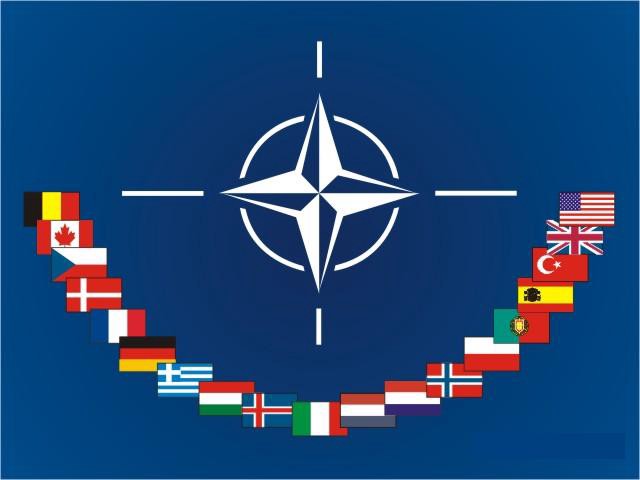NATO leaders are expected to agree on the deployment of four new battle groups to the alliance’s eastern flank in response to Russia’s invasion of Ukraine.
Leaders will agree to deploy troops to Bulgaria, Hungary, Romania, and Slovakia at Thursday’s NATO summit in Brussels, according to NATO Secretary General Jens Stoltenberg.
‘I expect leaders to agree to strengthen NATO’s posture in all domains, with significant increases in the eastern part of the alliance on land, in the air, and at sea,’ Stoltenberg said ahead of the NATO emergency summit on Russia’s invasion of Ukraine.
The NATO commander also pledged to provide additional assistance to Ukraine in dealing with chemical and nuclear threats as it fights Russia’s invading forces.
‘I expect allies to agree tomorrow to provide additional support, including cybersecurity assistance and equipment to assist Ukraine in protecting against chemical, biological, radiological, and nuclear threats,’ Stoltenberg said.
Vladimir Putin has been accused of using prohibited white phosphorus weapons in Ukraine, raising concerns that he is on the verge of resorting to chemical warfare.
Stoltenberg also accused China of providing ‘blatant lies’ to Russia as it attacks Ukraine, and warned Beijing against providing material support to Moscow’s war effort.
‘China has provided Russia with political support, including through the spread of blatant lies and misinformation, and allies are concerned that China may provide material support for the Russian invasion,’ said NATO Secretary General Jens Stoltenberg.
‘I expect leaders to call on China to live up to its UN Security Council responsibilities, refrain from supporting Russia’s war effort, and join the rest of the world in calling for an immediate, peaceful end to this war.’
China, which has not condemned Russia’s invasion and has criticised Western sanctions, defended Moscow on Wednesday, calling Russia a “important member” of the G20 after Washington raised the prospect of barring Moscow from membership.
US President Joe Biden warned his Chinese counterpart Xi Jinping last week that there would be “consequences” if Beijing supported Russia during its invasion of Ukraine.
Following the Russian President’s visit to Beijing for the Winter Olympics earlier this year, Jinping and Putin declared a “no limits” relationship.
Meanwhile, Stoltenberg stated that with the new NATO battle groups being deployed in Bulgaria, Slovakia, Romania, and Hungary, as well as the existing forces in the Baltic states and Poland, NATO will have eight multinational groups along its eastern flank.
According to Stoltenberg, the Ukraine crisis has demonstrated that NATO’s deterrence and defence posture must be reset for the long term.
Meanwhile, Russia refuses to rule out the use of nuclear weapons in the face of a ‘existential threat,’ according to Kremlin spokesman Dmitry Peskov.
Pentagon spokesman John Kirby slammed Moscow’s “dangerous” rhetoric, and Biden warned on his way to Europe that Russia may use chemical weapons in Ukraine as its ground offensive stalls.
‘Our armed forces and citizens are displaying superhuman courage,’ said Andriy Yermak, a top adviser to Zelensky, as Biden travelled to the NATO, G7, and European Union summits in Brussels.
‘However, we cannot win a war without offensive weapons, medium-range missiles that can be used as a deterrent,’ Yermak said.
NATO warned on Wednesday that Russia’s war in Ukraine could escalate into a nuclear conflict between Moscow and the West.
‘Russia should put an end to its dangerous and irresponsible nuclear rhetoric,’ Stoltenberg said. ‘However, there should be no doubt about our willingness to protect and defend allies against any threat at any time.’
‘Russia must understand that it will never win a nuclear war,’ he said on the eve of a Western military alliance summit in Brussels. ‘NATO is not a party to the conflict… it provides assistance to Ukraine but is not a party to it.’
‘NATO will not deploy troops to Ukraine…’ It is critical to provide assistance to Ukraine, and we are doing so. At the same time, it is critical to keep this conflict from escalating into a full-fledged war between NATO and Russia.
While not strictly a chemical weapon, the substance burns fiercely and can cause horrific injuries, and its use on civilians is a war crime.
According to Human Rights Watch, incendiary weapons are “among the cruellest” in modern warfare because they cause “lifelong human suffering.”
Oleksiy Biloshytskiy, the deputy chief of Kyiv police, posted on Facebook, ‘Another use of phosphorus ammunition in Kramatorsk.’
He posted a video of a substance burning, similar to the chemical used by Russian troops in the cities of Lutsk and Popasna.
‘What we’re seeing is a desperate attempt by the Russians to gain some momentum and try to change the course of this,’ a defence official said.
Stoltenberg also stated today that Belarus was ‘complicit’ in Russia’s invasion of Ukraine even before it began, allowing its territory to be used for troop massing, and that it continues to enable the invasion.
He said at a news conference on the eve of a NATO summit in Brussels that Belarus has also allowed Russian forces to use its military airfields to launch attacks on Ukrainian cities and civilians.
Meanwhile, Ukraine has asked for more Western military assistance ahead of a NATO summit, warning that Russian bombardment has trapped nearly 100,000 people.




















